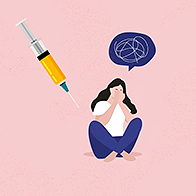When Should Periods Make You Worry?

If you're anything like me, you dread the approach of your period, as it seems like life is dominated by its arrival. Cramps, bloating, nausea and acne: Once every 28 days, give or take, I deal with the nasty side effects of hormonal changes that don't subside until a few days after the start of my period.
Every person's menstrual cycle is a bit different when it comes to length, flow and the side effects that accompany it, so it's somewhat of a challenge to figure out if your period is "normal." Following are some common period side effects and facts to help you decide if you should be asking your gyno for help.
Cramps
Menstrual cramps are a normal part of a period when they last for two to three days. Such pain is sometimes referred to as primary dysmenorrhea and can be severe enough to interfere with daily activities, productivity and even self-esteem.
Primary dysmenorrhea is caused by prostaglandins, the chemicals that are made in the lining of the uterus. Prostaglandin levels are high during the start of your period, making the blood vessels of the uterus contract.
A normal period should not require medical attention. There are several ways to help with menstrual cramps, including diet, over-the-counter medications (e.g., ibuprofen and naproxen) and incorporating proven remedies such as dry heat. However, if your menstrual cramping is accompanied by fever, vomiting, dizziness, unusual bleeding, abnormal discharge from the vagina or pain exceeding that of a normal period's discomfort and intensity, contact your doctor.
Irregular periods
A period is considered irregular if your menstrual cycle occurs outside of a typical range but is categorized by abnormal uterine bleeding as well. If you have irregular periods and notice that there is an increase or decrease in your flow's intensity, color or duration, or a skipped period, it may be cause for concern. Irregular menstruation may be due to several causes. Some of the more common reasons for irregularity include some forms of hormonal birth control, pregnancy, stress, uncontrolled diabetes, thyroid issues, polycystic ovary syndrome (PCOS), perimenopause or menopause.
Heavy flow
Periods can be heavy from causes that aren't an underlying disease, but extremely heavy periods may be a sign of uterine issues. If you're bleeding for more than seven days or bleed through tampons quickly, you may be experiencing menorrhagia.
Some periods are heavier than others, which are caused by hormonal changes occurring during menopause or perimenopause, side effects from birth control containing higher levels of hormones before use, uterine fibroids or endometriosis.
Spotting
A normal period can sometimes be light and may not include the usual cramps. This is common, but if your periods are unusually light or nonexistent, there could be a more serious issue like an infection.
The menstrual cycle is not always predictable. Menstrual irregularity can have many different causes, some of which are benign and others that may point to reproductive tract issues or diseases such as endometrial or ovarian cancer. It's best to consult with a gynecologist to rule out these latter conditions that require medical treatment.
Abnormal vaginal discharge
The vagina is lined with a mucous membrane that will produce discharge to keep it clean and moist. If you experience vaginal discharge that is bloody, brownish, watery or malodorous, you may have an infection of the cervix or uterus, such as gonorrhea or endometritis.
Trust your instincts
While everyone is different, if you notice sudden changes in your cycle or you're plagued by symptoms outside of the range of normalcy as mentioned above, don't hesitate to bring your symptoms to your gynecologist's attention. While it may take some time to find out what exactly is at the root of the problem, your doctor is equipped to help put your worries at ease or work with you to find solutions.




















